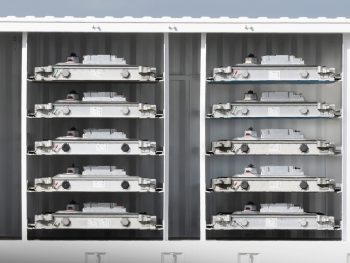JLR to reuse EV batteries for renewable energy storage system
Used batteries from Jaguar Land Rover (JLR) electric vehicles are being repurposed for one of the UK’s largest energy storage systems to maximise the benefits of solar and wind power.

Each battery storage system features 30 used I-Pace batteries, able to store up to 2.5MWh of energy at full capacity
The carmaker has teamed up with Wykes Engineering to give the former Jaguar I-Pace batteries a second life in Wykes’ Battery Energy Storage Systems (BESS), which will store renewable energy to help decarbonise the grid and deal with peaks in demand.
Each large-scale container system features 30 used I-Pace batteries, taken from prototype and engineering test vehicles and able to store up to 2.5MWh of energy at full capacity.
The storage systems are linked to advanced inverters to maximise efficiency and manage energy and are capable of supplying power direct to the National Grid during peak hours as well as drawing power out of the grid during off-peak hours to store for future use.
David Wykes, managing director of Wykes Engineering, added: “One of the major benefits of the system we’ve developed is that the containers are connected to the grid in such a way that they can absorb solar energy that could otherwise be lost when the grid reaches capacity. This excess energy can now be stored in the second life I-Pace batteries and discharged later. This allows us to ‘overplant’ the solar park and maximise the amount of power we generate for the area of land we are using.”
JLR will initially supply batteries for three containers – able to power 750 homes for a day in total – by the end of 2023. After this point more containers can be created to house additional second-life batteries removed from used production vehicles in the future.
The project aligns with JLR’s ambition to adopt circular economy principles based on a ‘Use Less, Use Longer, Use Again’ philosophy to limit the use of virgin materials. Its batteries will still have a 70-80% residual capacity once their health falls below the higher demands of an electric vehicle and can be used in low-energy situations.
The move also supports JLR’s drive to achieve carbon net zero by 2039 across its supply chain, products, and operations under its Reimagine strategy.
François Dossa, executive director, strategy and sustainability at JLR, said: “Our sustainability approach addresses the entire value chain of our vehicles, including circularity of EV batteries. Our EV batteries are engineered to the highest standards and this innovative project, in collaboration with Wykes Engineering, proves they can be safely reused for energy sector application to increase renewable energy opportunities. Using the 70-80% residual capacity in EV batteries, before being recycled, demonstrates full adoption of circularity principles.
“Working together with industry-leading partners, we are developing a complete EV ecosystem, from batteries to charging, supporting our net-zero transformation.”







